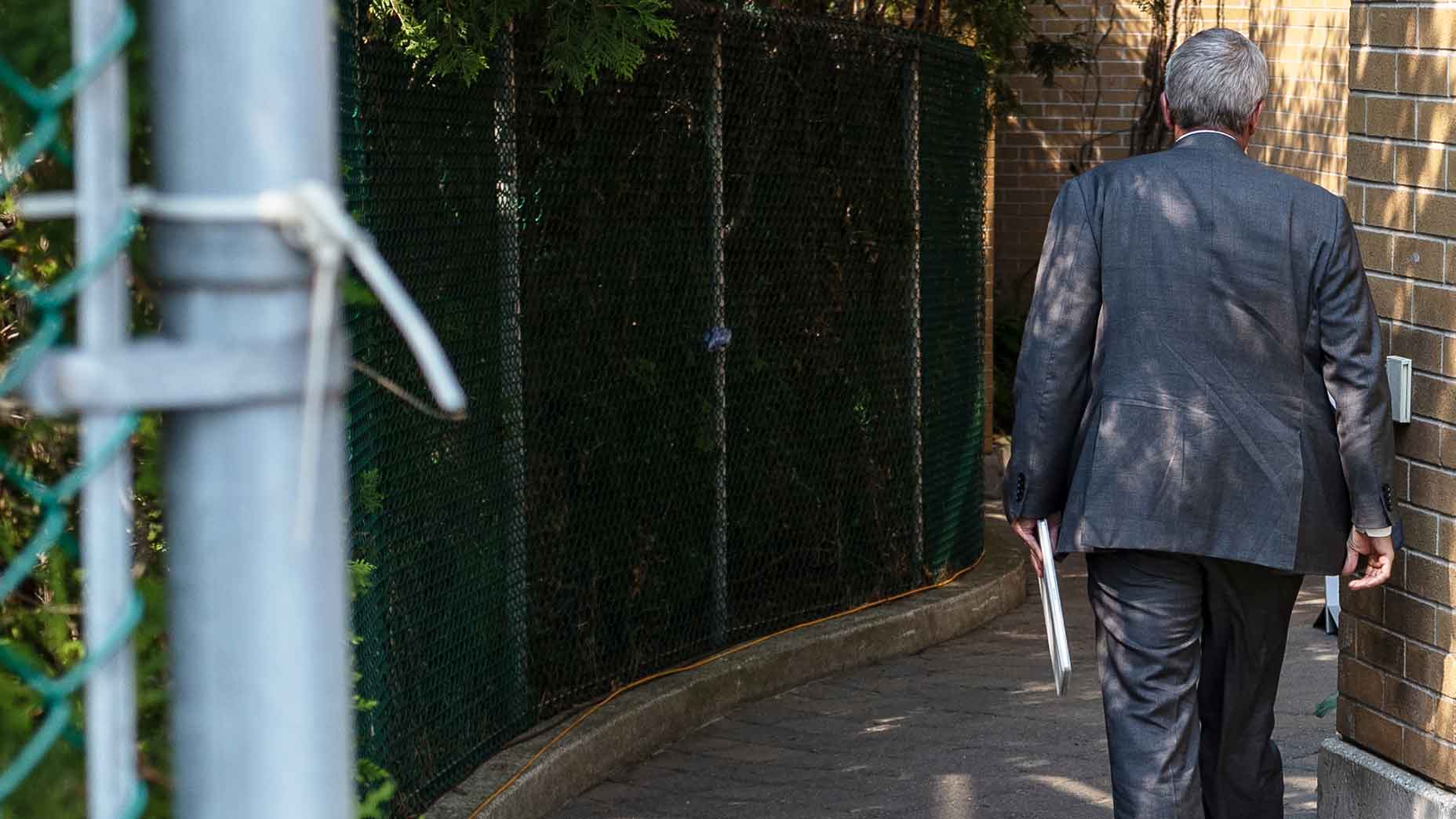
Jay Monahan walks into the players-only meeting on Tuesday at the Canadian Open.
Getty Images
The PGA Tour couldn’t win against Saudi Arabia’s “unlimited money,” Jay Monahan told his employees.
So the Tour and its commissioner came to the table, the Wall Street Journal is reporting.
Monahan’s admission came Thursday, two days after the proposed bombshell agreement among the Tour, the DP World Tour and the Saudi Public Investment Fund. That deal would create a new, for-profit enterprise that would be operated by the trio and end the pending litigation among the sides.
But why now? In a speech on Thursday at PGA Tour headquarters, according to the Wall Street Journal, Monahan said that the Tour couldn’t afford to keep spending against Saudi-backed LIV Golf — the Tour had spent around $50 million in various legal fights with LIV, and it had used $100 million of its reserves to pay for its schedule.
“We cannot compete with a foreign government with unlimited money,” Monahan said, according to the Wall Street Journal. “This was the time. … We waited to be in the strongest possible position to get this deal in place.”
According to the Wall Street Journal, Monahan was also asked how he would explain to his daughters why he was working with Saudi Arabia, given its treatment of women — to which he said: “The circumstances we were in” meant that he had to “think about all of our players. I have to think about everybody in this room.”
“I understand all the human rights concerns,” he added. “I’ve had them myself.”
At a minimum, the deal among the Tour, the DP World Tour and the PIV was a shock. Since LIV started play a year ago, the series had attracted numerous pros with guaranteed, large-money deals, the Tour responded with a revamped schedule and beefed-up purses, and the sides each filed lawsuits. And then, just like that, the fight was over. On Tuesday, the proposed deal was announced, and Monahan and Yasir Al-Rumayyan, PIF’s governor, sat side-by-side on CNBC.
Hours later, Monahan met with players at the Canadian Open, this week’s Tour event, then held a virtual press conference with reporters. There, he was asked this: “When Roger Clemens went from the Red Sox to the Yankees, it was a business thing, but this thing, as you know probably better than almost anybody, had a lot of heightened emotion because it was Saudi money, and you talked yourself, you took a moral high ground: You never have to apologize for being a member of the PGA Tour. Something really significant changed here. Was it just the business, or was there more to it than that?”
His answer was vague.
“Listen, I think that as time went on, and you’ve heard me say a couple times, circumstances change,” Monahan said. “What changed? I looked at where we were at that point in time, and it was the right point in time to have a conversation.
“Going back to the origin of LIV, I said this: They needed to go down their path and we were going to go down ours. We’ve done everything we can within our control to improve and grow the PGA Tour, and they have launched LIV; they’ve proceeded with LIV; they’ve made progress with LIV. But ultimately it was looking at the broader picture and saying that I don’t think it’s right or sustainable to have this tension in our sport, and to be able to organize and orient this in a way where, again, we’re in a control position, we have an investor, a great and world-class investor, and I recognize everything that I’ve said in the past and in my prior positions.
“I recognize that people are going to call me a hypocrite. Anytime I said anything, I said it with the information that I had at that moment, and I said it based on someone that’s trying to compete for the PGA Tour and our players.
“I accept those criticisms. But circumstances do change. I think that in looking at the big picture and looking at it this way, that’s what got us to this point.”
Another reporter later asked Monahan: “How would you describe the Tour’s immediate financial future if this deal had not been made, both in terms of handling the elevated purses, handling the cost of litigation ongoing, annually potentially? Just how sustainable was this in the next few years without this influx of money?”
His answer was unspecific.
“Well, listen, to make the changes in ’23 and ultimately to make the changes in ’24, we’ve had to invest back in our business through our reserves,” Monahan said. “But you hit it; between our reserves, the legal fees, our underpin and our commitment to the DP World Tour and their legal fees, it’s been significant.
“I’m grateful that when we looked to ’24, the response that we’ve gotten from our sponsors and our partners has been very positive, and those losses that we’ve experienced in ’23 will be significantly mitigated.
“But you have to look at all the monies that we make, we make in the commercial realm, and we’re in long-term media deals. We’ve done a long-term — we’ve done a number of long-term sponsorship deals thanks to the great partners that we have.
“But this puts us in a position where we’ve got capital that we can deploy to the benefit of our members and through our tournaments, and it gives us capital to deploy in growth businesses that ultimately will generate a return that we’ll reinvest in our players.
“Hopefully that answers your question.”












